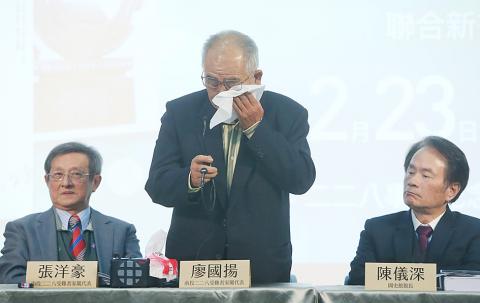The Memorial Foundation of 228 yesterday launched three books documenting different aspects of the 228 Incident to mark the 73rd anniversary of the massacre.
The 228 Incident refers to a crackdown launched by the then-Chinese Nationalist Party (KMT) regime against civilian demonstrators following an incident in Taipei on Feb. 27, 1947.
About 18,000 to 28,000 people, many of them members of the intellectual elite, were killed during the subsequent government crackdown, which lasted into early May 1947.

Photo: CNA
The event also marked the beginning of the White Terror era that saw thousands of people arrested, imprisoned or executed.
The Puzzle of the 228 Incident (拼圖二 二 八), The Oral History of the Battle of Wuniulan (南投二 二 八口述歷史訪談錄) and Beyond 1947: A Non-daily Memoranda (1947之後:二 二 八 (非)日常備忘錄) were launched to cast light on the massacre from different perspectives.
The Puzzle of the 228 Incident, by Academia Historica President Chen Yi-shen (陳儀深), is a compilation of major research findings and theses pertaining to the Incident.
The Oral History of the Battle of Wuniulan is a collection of 27 interviews with eyewitnesses and descendants of victims, conducted by Lin Wei-sheng (林偉盛) and several other people. It focuses on the battle between revolutionaries and KMT troops in Wuniulan, today’s Ailan (愛蘭) in Nantou County, shortly after the massacre.
Speaking at a launch event at the National 228 Memorial Museum, Lin said he encountered difficulties when conducting the interviews, as many survivors and witnesses were still afraid to talk even 73 years after the massacre.
Some of the interviewees also spoke at the ceremony.
Liao Kuo-yang (廖國揚) said that he was born after his father was killed in the Battle of Wuniulan, and his uncle was named as his father in his birth certificate for fear of reprisals from the government.
Chang Yang-hao (張洋豪), another interviewee who also lost his father in the battle, said that he saw bodies piled up in the town square after clashes.
Beyond 1947: A Non-daily Memoranda is comprised of eight articles written by a team of history researchers to give a contemporary perspective on the incident, drawing on material from the national archives, oral history and academic research.
The books were published in Mandarin.
Chairman of the memorial foundation Hsueh Hua-yuan (薛化元) said at the event that the search for truth behind the incident would deepen the values of democracy and human rights in Taiwan, and give its people spiritual strength to deal with external threats.
The foundation would continue to collect and release the names of possible victims of the incident and hopes to achieve information breakthroughs with the aid of new technology, he said.

Taiwanese can file complaints with the Tourism Administration to report travel agencies if their activities caused termination of a person’s citizenship, Mainland Affairs Council Minister Chiu Chui-cheng (邱垂正) said yesterday, after a podcaster highlighted a case in which a person’s citizenship was canceled for receiving a single-use Chinese passport to enter Russia. The council is aware of incidents in which people who signed up through Chinese travel agencies for tours of Russia were told they could obtain Russian visas and fast-track border clearance, Chiu told reporters on the sidelines of an event in Taipei. However, the travel agencies actually applied

New measures aimed at making Taiwan more attractive to foreign professionals came into effect this month, the National Development Council said yesterday. Among the changes, international students at Taiwanese universities would be able to work in Taiwan without a work permit in the two years after they graduate, explainer materials provided by the council said. In addition, foreign nationals who graduated from one of the world’s top 200 universities within the past five years can also apply for a two-year open work permit. Previously, those graduates would have needed to apply for a work permit using point-based criteria or have a Taiwanese company

The Shilin District Prosecutors’ Office yesterday indicted two Taiwanese and issued a wanted notice for Pete Liu (劉作虎), founder of Shenzhen-based smartphone manufacturer OnePlus Technology Co (萬普拉斯科技), for allegedly contravening the Act Governing Relations Between the People of the Taiwan Area and the Mainland Area (臺灣地區與大陸地區人民關係條例) by poaching 70 engineers in Taiwan. Liu allegedly traveled to Taiwan at the end of 2014 and met with a Taiwanese man surnamed Lin (林) to discuss establishing a mobile software research and development (R&D) team in Taiwan, prosecutors said. Without approval from the government, Lin, following Liu’s instructions, recruited more than 70 software

Taiwanese singer Jay Chou (周杰倫) plans to take to the courts of the Australian Open for the first time as a competitor in the high-stakes 1 Point Slam. The Australian Open yesterday afternoon announced the news on its official Instagram account, welcoming Chou — who celebrates his 47th birthday on Sunday — to the star-studded lineup of the tournament’s signature warm-up event. “From being the King of Mandarin Pop filling stadiums with his music to being Kato from The Green Hornet and now shifting focus to being a dedicated tennis player — welcome @jaychou to the 1 Point Slam and #AusOpen,” the